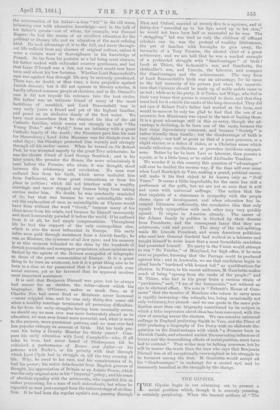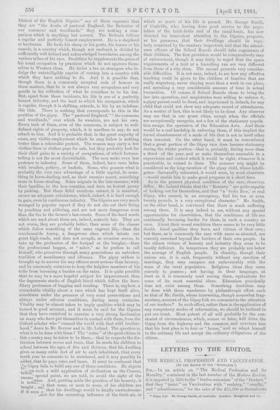THE GIPSIES.
THE Gipsies begin in our educating era to present a social problem which, though it is scarcely pressing, is certainly perplexing. When the learned authors of "The Dialect of the English Gipsies" say of those vagrants that they are "the Arabs of pastoral England, the Bedouins of ssur commons and woodlands," they are making a com- parison which is anything but correct. The Bedouin follows ,a regular and perfectly honest employment. He is a shepherd or herdsman. He feeds his sheep or his goats, his horses or his -camels, in a country which, though not enclosed, is divided by sufficiently well defined and acknowledged boundaries among the various tribes of his race. Doubtless he supplements the gains of his usual occupation by practices which do not approve them- selves to Western ideas. He levies a tax on strangers who in- -clulge the unintelligible caprice of coming into a country with which they have nothing to do. And it is possible that, though there is. a commonly accepted code of honour in these matters, that lie is not always very scrupulous and very gentle in his collection of what he considers to be his due. But, apart from these incidents, his life is one of a perfectly honest industry, and the land to which his occupation, which is regular, though it is shifting, extends, is his by an indefeas- ible title. There is nothing that corresponds to this in the position of the gipsy. The " pastoral England," " the commons and woodlands," over which he wanders, are not his own. Every inch of them, even of the commons, is subject to well- -defined rights of property, which, it is needless to say, do not attach to him. And it is probable that, in the great majority of -cases, any visible employment which he may follow is nothing better than a colourable pretext. The women may carry a few clothes-lines or clothes-pegs for sale, but they probably look for their chief gains to a variety of occupations, of which fortune- 'telling is not the most discreditable. The men make even less pretence to industry. Some of them, indeed, have vans laden with brushes, pottery, or baskets. Some, who possess what is probably the very rare advantage of a little capital, do some- thing in horse-dealing; and, as their enemies assert, something more in horse-stealing. Some migrate in the late summer, with -their families, to the hop-counties, and turn an honest penny by picking. But these fitful exertions cannot, it is manifest, secure an adequate subsistence, which, indeed, it is hard enough to gain, even by continuous industry. The Gipsies are very much wronged by popular report if they do not eke out their living by poaching and pilfering, and are not more dangerous even than the fox to the farmer's hen-roosts. Some of the hard words which are used about them are, indeed, scarcely fair. They are not worse, they are probably better, than some of the classes' which follow something of the same vagrant life,—than the irreclaimable tramp, a dangerous class which infests our great high-roads, and does not scruple, as occasion serves, to take up the profession of the footpad or the burglar,—than the professional beggar, or " asker," as he prefers to call himself, who preserves through many generations an unbroken tradition of mendicancy and idleness. The gipsy seldom is brought up to answer for any offence more serious than larceny, and he commonly contrives to keep the helpless members of his .tribe from becoming a burden on the rates, it is quite possible that he may be a more hopeful subject for improvement than the degenerate stocks of English blood which follow the here- ditary profession of begging and stealing. There is, anyhow, a remarkable vitality about a race which has kept itself alive, sometimes under the pressure of very cruel persecutions and always under adverse conditions, during many centuries. 'Vitality may be almost taken to imply qualities which may be turned to good account; and it must be said for the Gipsies that they have contrived to exercise a very strong fascination on many who have put themselves in contact with them, from the Oxford scholar who "roamed the world with that wild brother- hood," down to Mr. Borrow and to Mr. Leland. The question is, what is to be done with them ? The " notes " of the good citizen in this country may be taken to be these,—that he respects the dis- tinction between mourn and tuum, that he sends his children to
school between the ages of five and thirteen, that his dwelling gives so many cubic feet of air to each inhabitant, that every tenth year he consents to be numbered, and it may possibly be added, that he pays rates and taxes. It must be confessed that
",e Gipsy fails to fulfil any one of these conditions. Ho objects ttaolin, such a mild application of civilisation as the Census, enume,• special pains, we are told, to avoid the sight of the is notator. And, putting aside the question of his honesty, it
'8 that none, or next to none, of his children are taught, anc
if it were r that Ids dwellings would be fatally unwholesome,
.rsot for the correcting influence of the fresh air, in which so much of his life is passed. Mr. George Smith, of Coalvillo, who, having done good service to the popu- lation of the brick-fields and of the canal-boats, has now directed his benevolent attention to the Gipsies, proposes, as his panaceas, that their dwellings should be regu-
larly examined by the sanitary inspectors, and that the attend- ance officers of the School Boards should take cognisance of their children. The first provision would be comparatively easy of enforcement, though it may fairly be urged that the space requirements of a tent or a travelling van are very different from those of a city slum. The second presents very consider- able difficulties. It is not easy, indeed, to see how any effective teaching could be given to the children of families that are really migratory, never staying more than a week in one place, and spending a very considerable amount of time in actual locomotion. Of course, if School Boards chose to bring the law into operation, and magistrates were willing to enforce it, gipsy parent could be fined, and imprisoned in default, for any child that could not show any adequate record of attendances. As a matter of fact, this is not likely to be done. Any observer may see that in our great cities, except when the officials are exceptionally energetic, not a few of the stationary popula tion escape the operation of the Education Acts. And there would be a real hardship in enforcing them, if this implied the forced abandonment of a mode of life that is not in itself other than innocent. On the other hand, it must be remembered that a great portion of the Gipsy race does become stationary during the winter portion—that is, probably, during more than a third—of the year, and so make themselves amenable to a supervision and control which it would be right, whenever it is practicable, to extend to them. The summer trip might be considered. as the long vacation of the gipsy child, whose intelli- gence—favourably estimated, it would seem, by most observers —would enable him to make good progress in a short time.
As to the present physical condition of the race, observers differ. Mr. Leland thinks that the " Romany " are quite capable of looking out for themselves, and that "a tacho Rom,' or real Gipsy, who cannot, in an emergency, find his ten or even twenty pounds, is a very exceptional character." Mr. Smith, on the other hand, is convinced that there is much suffering among them. It is easy indeed to see, without any special opportunities for observation, that the conditions of life are continually becoming harder for them, in such a country as ours. About their moral condition there seems to be very little doubt. Good qualities they have, and virtues of their own ; but these, as is commonly the case with races so situated, are scarcely exercised beyond the borders of their own people. In the citizen virtues of honesty and industry they seem to be mostly deficient. In temperance they are probably not below the average of English people. In chastity, though their unions are, it is said, frequently without any sanction of marriage, they may compare not unfavourably with the mass of the rural population. Religious ideas they seem scarcely to possess ; not having in their language, at least as it is commonly used among them, equivalents for some of its most essential ideas, Education practically does not exist among them. Something doubtless may be done with these wanderers by philanthropic effort such as that of Mr. Smith, whose interesting, though somewhat f rag- rnentary, account of the Gipsy folk we commend to the attention
of our readers.* In such effort, rather than in the application of any compulsory modes of reformation, we should be inclined to put our trust. Most potent of all will probably be the con- straiut of circumstances, which, sooner or later, will drive the Gipsy from the highway and the common, and convince him
that his best plan is to hair or "house," and so adapt himself to the ordinary life and accept the ordinary obligations of the citizen.



































 Previous page
Previous page